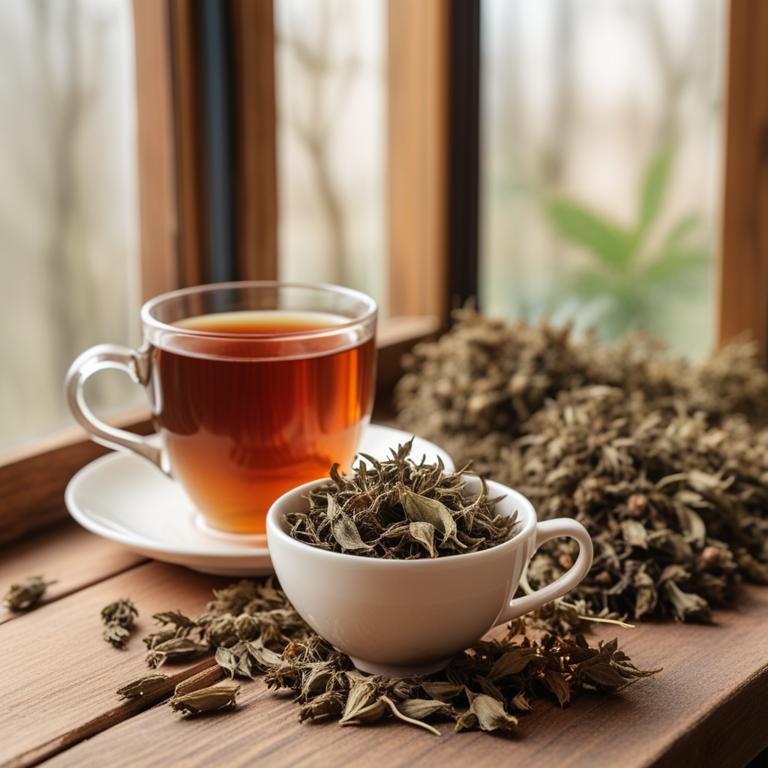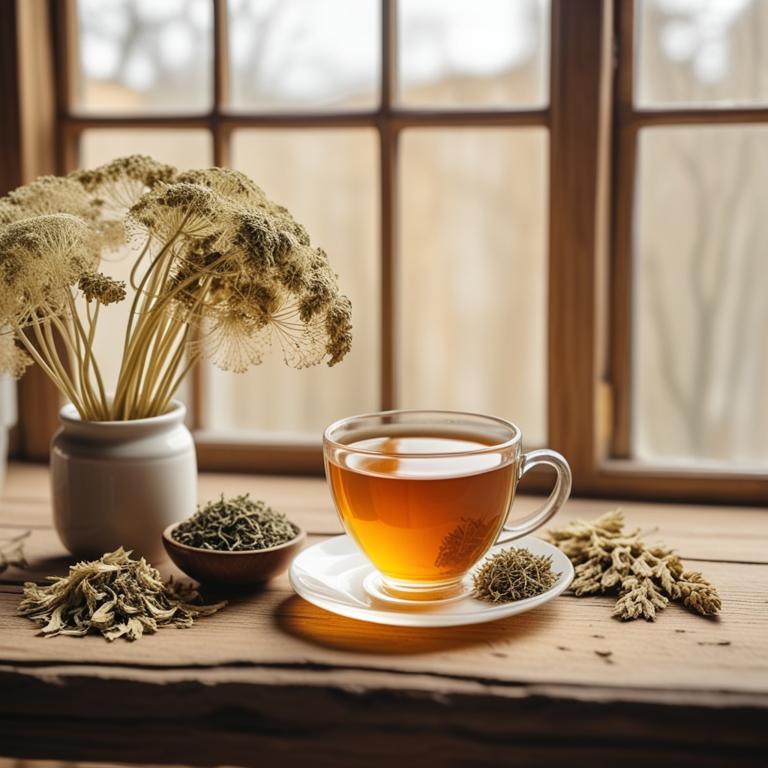9 Herbal Teas For Arthritis

Herbal teas can be a great way to help manage arthritis symptoms.
Some herbs have anti-inflammatory properties that can reduce swelling and ease pain. For example, Curcuma longa, also known as turmeric, contains a compound called curcumin, which has potent anti-inflammatory effects. When you drink turmeric tea, the curcumin is absorbed into your body and helps to reduce joint inflammation. Ginger, or Zingiber officinale, is another herb that's often used to relieve arthritis symptoms.
It has anti-inflammatory properties that can help to reduce pain and stiffness. Licorice root, or Glycyrrhiza glabra, can also be beneficial. It has anti-inflammatory properties that can help to reduce joint pain and swelling. Drinking herbal teas like these can make a big difference in your life. It can help you to move more easily, sleep better, and enjoy activities that you love without the pain and stiffness of arthritis.
By reducing inflammation and pain, herbal teas can help you to take back control of your life and live more comfortably.
- 1. Curcuma longa
- 2. Zingiber officinale
- 3. Glycyrrhiza glabra
- 4. Echinacea purpurea
- 5. Angelica sinensis
- 6. Ginkgo biloba
- 7. Lavandula angustifolia
- 8. Cinchona officinalis
- 9. Rheum palmatum
1. Curcuma longa

Curcuma longa teas contains a group of compounds called curcuminoids, which are the main active constituents.
The most well-known curcuminoids are curcumin, demethoxycurcumin, and bisdemethoxycurcumin. These curcuminoids have potent anti-inflammatory and antioxidant properties, which can help to reduce joint inflammation and pain associated with arthritis. Curcumin has been shown to inhibit the production of pro-inflammatory enzymes and cytokines, which contribute to the development of arthritis.
By reducing inflammation and oxidative stress, curcuma longa teas may help to alleviate symptoms of arthritis, such as joint pain and stiffness.
- Gather 1 cup of water, 1 tablespoon of dried turmeric root (Curcuma longa), and a tea infuser or strainer.
- Boil the water in a pot and let it cool for 1 minute.
- Add the dried turmeric root to the tea infuser or strainer.
- Steep the turmeric root in the water for 5-7 minutes.
- Strain the tea and drink it warm, 1-2 times a day, for relief from arthritis symptoms.
2. Zingiber officinale

Zingiber officinale teas contains a compound called gingerol and shogaol, which are responsible for its anti-inflammatory properties.
These properties help reduce pain and swelling in the joints, making it a popular remedy for arthritis. Gingerol and shogaol also have antioxidant and anti-catabolic effects, which slow down the breakdown of cartilage and help maintain joint health. The anti-inflammatory properties of gingerol and shogaol also help reduce the production of prostaglandins, which are hormone-like substances that cause pain and inflammation in the joints.
Regular consumption of Zingiber officinale teas may help alleviate arthritis symptoms by reducing inflammation and promoting joint health.
- Gather 1 tablespoon of dried Zingiber officinale root, 1 cup of boiling water, and a tea infuser or strainer.
- Place the Zingiber officinale root in the tea infuser or strainer.
- Pour 1 cup of boiling water over the Zingiber officinale root.
- Steep for 5-7 minutes, then strain the tea into a cup.
- Drink 1/2 to 1 cup of the tea 2-3 times a day, as needed to help manage arthritis symptoms.
Zingiber Officinale Tea on Amazon
FGO Organic Ginger Tea, 100 Count, Eco-Conscious Tea Bags, Caffeine Free, Packaging May Vary (Pack of 1)
Disclaimer: We earn a commission if you click this link and make a purchase at no additional cost to you.
3. Glycyrrhiza glabra

Glycyrrhiza glabra teas contains a number of active compounds, including glycyrrhizin and flavonoids.
These compounds have anti-inflammatory properties that help to reduce pain and swelling in joints. Glycyrrhizin also has a corticosteroid-like effect, which can help to reduce inflammation and alleviate symptoms of arthritis. The flavonoids present in the tea have antioxidant properties, which can help to protect the joints from damage caused by free radicals.
By reducing inflammation and protecting the joints, Glycyrrhiza glabra teas may be a helpful addition to a treatment plan for arthritis sufferers.
- Gather 2 cups of water and 1 teaspoon of dried Glycyrrhiza glabra root.
- Heat the water in a pot over medium heat until it starts boiling.
- Add the dried Glycyrrhiza glabra root to the boiling water and reduce heat to low.
- Let the mixture simmer for 5-7 minutes, then strain it into a cup.
- Add honey to taste, if desired, and drink the tea 2-3 times a day for arthritis relief.
4. Echinacea purpurea

Echinacea purpurea teas contains several bioactive constituents, including alkylamides, caffeic acid derivatives, and glycosides.
These compounds have anti-inflammatory properties that help reduce swelling and pain associated with arthritis. The caffeic acid derivatives in Echinacea purpurea teas have potent antioxidant effects, which can neutralize free radicals that contribute to joint inflammation. The glycosides, such as echinacoside, also exhibit anti-inflammatory activity, which can help alleviate arthritis symptoms.
By reducing inflammation and oxidative stress, Echinacea purpurea teas may help alleviate joint pain and stiffness associated with arthritis.
- Gather 2 teaspoons of dried Echinacea purpurea root or flowers.
- Combine the Echinacea with 1 cup of boiling water in a tea infuser or a heat-resistant cup.
- Steep for 5-7 minutes, then strain the liquid into another cup.
- Add honey or lemon to taste, if desired.
- Drink 1-2 cups of the tea 2-3 times a day for relief from arthritis symptoms.
5. Angelica sinensis

Angelica sinensis teas contains a group of bioactive constituents called polysaccharides and triterpenoid saponins.
These compounds have anti-inflammatory properties, which help reduce swelling and pain associated with arthritis. The triterpenoid saponins, specifically, have been shown to inhibit the production of pro-inflammatory cytokines, substances that contribute to joint inflammation. Additionally, the polysaccharides in Angelica sinensis teas have been found to have antioxidant properties, which help protect cells from damage caused by free radicals and promote healing.
By reducing inflammation and protecting cells, Angelica sinensis teas may help alleviate the symptoms of arthritis.
- Gather 1 cup of dried Angelica sinensis root. You can buy it from a health food store or online.
- Measure 1/2 cup of the dried root and put it in a bowl.
- Boil 2 cups of water in a pot. Then, pour the boiling water over the Angelica sinensis root in the bowl.
- Let it steep for 5-7 minutes. Strain the liquid into another pot or cup to remove the root.
- Drink 1/2 to 1 cup of the tea, 2-3 times a day, for relief from arthritis symptoms.
6. Ginkgo biloba

Ginkgo biloba teas contains flavoglycosides, bilobalide, and ginkgolides, which are bioactive constituents that help alleviate arthritis symptoms.
These compounds have anti-inflammatory properties, which reduce swelling and pain in the joints. The flavonoids in Ginkgo biloba also have antioxidant properties, which help protect the joints from damage caused by free radicals. Ginkgolides, in particular, have been shown to inhibit the production of pro-inflammatory chemicals, which contribute to joint pain and inflammation.
By reducing inflammation and oxidative stress, Ginkgo biloba teas may help improve joint mobility and reduce the severity of arthritis symptoms.
- Gather 1 cup of water and 1 teaspoon of dried Ginkgo biloba leaves.
- Heat the water in a pot until it starts boiling.
- Add the Ginkgo biloba leaves to the boiling water and turn off the heat.
- Let the leaves steep in the water for 5-10 minutes.
- Strain the tea and drink 1/2 cup, 2-3 times a day for arthritis relief.
7. Lavandula angustifolia

Lavandula angustifolia teas contains a range of bioactive constituents, including linalool and linalyl acetate.
These compounds have anti-inflammatory properties, which help reduce swelling and pain in the joints. The tea's antioxidant properties also help protect the body from oxidative stress, which can contribute to arthritis symptoms. Additionally, linalool has been shown to have a calming effect on the nervous system, which can help alleviate the stress and anxiety often associated with arthritis.
By reducing inflammation and promoting relaxation, Lavandula angustifolia teas may help alleviate some of the symptoms of arthritis.
- Gather 1 cup of dried Lavandula angustifolia flowers. You can buy them at a health food store or online.
- Measure 1 tablespoon of dried flowers and place them in a tea infuser or a small muslin bag.
- Heat 1 cup of boiling water in a kettle or on the stovetop.
- Pour the hot water over the dried flowers in the tea infuser or muslin bag. Let it steep for 5-7 minutes.
- Strain the tea and discard the flowers. Drink 1 cup of the tea 2-3 times a day to help with arthritis symptoms.
8. Cinchona officinalis

Cinchona officinalis teas contains a compound called quinine, which has anti-inflammatory properties.
These properties help reduce swelling and ease pain in people with arthritis. Quinine also has antimalarial properties, but its anti-inflammatory effects are especially useful in treating joint pain and inflammation. Additionally, Cinchona officinalis teas contain another compound called alkaloid, specifically cinchonine, which also has anti-inflammatory properties.
By reducing inflammation and easing pain, Cinchona officinalis teas can help alleviate symptoms of arthritis, such as stiffness and pain in the joints.
- Gather 2 tablespoons of dried Cinchona officinalis leaves and 1 cup of boiling water.
- Place the dried leaves in a tea infuser or a heat-resistant cup.
- Pour 1 cup of boiling water over the leaves and let it steep for 5-7 minutes.
- Strain the tea into a cup using the infuser or a fine-mesh sieve.
- Drink the tea 2-3 times a day, ideally after meals, to help alleviate arthritis symptoms.
9. Rheum palmatum

Rheum palmatum teas contains active constituents like emodin, rhein, and anthraquinones, which have anti-inflammatory properties.
These compounds help reduce swelling and pain in the joints, a common symptom of arthritis. The anthraquinones in Rheum palmatum also have a direct effect on the body's inflammatory response, which contributes to the progression of arthritis. Rhein, a key component of Rheum palmatum, has been shown to inhibit the production of pro-inflammatory enzymes, further reducing inflammation.
By targeting the underlying causes of arthritis, Rheum palmatum teas may help alleviate symptoms and provide relief for those affected.
- Gather 2 tablespoons of dried Rheum palmatum root and 1 cup of boiling water.
- Steep the root in the boiling water for 5-7 minutes. Strain the liquid using a fine-mesh sieve or cheesecloth.
- Let the tea cool down. Add honey or lemon to taste, if needed.
- Drink 1/2 cup of the tea, 2-3 times a day. You can store the remaining tea in the fridge for later use.
- Consult a doctor or a healthcare professional before using Rheum palmatum tea for arthritis treatment, especially if you have any underlying health conditions.